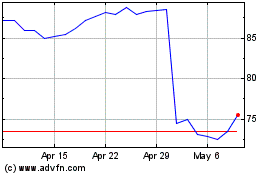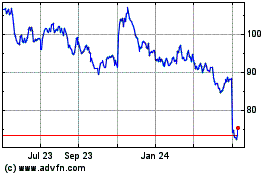For Some Big-Name CEOs, Pay Declines as Investors Gain
June 02 2016 - 11:03AM
Dow Jones News
By Theo Francis and Joann S. Lublin
Activist investors and politicians alike have taken aim at CEOs
for getting big raises with lousy performance. But when a big-name
chief executive's pay falls despite strong returns, it typically
draws less attention.
Total pay for Howard Schultz, the longtime chief of Starbucks
Corp., dropped 6.4% to $20.1 million in fiscal 2015. The company's
shareholder return for the year, at 52.3%, far outstripped the
-12.9% median return for consumer-services companies.
The decline in pay partly reflects the company's shift to
compensating Mr. Schultz with restricted stock units tied to
corporate performance, and away from stock options. His total
equity award for the year fell by about $2.2 million to $14.4
million.
Most of Mr. Schultz's pay comes from long-term incentive
compensation, a Starbucks spokeswoman said.
Mr. Schultz still benefited from his significant Starbucks
holdings. Last year, he received $90.3 million from exercising
options, and had restricted stock units vest that were valued at
$33.6 million. Mr. Schultz and other top executives also earned
bonus awards above their targets because of the company's strong
performance.
At athletic apparel company Under Armour Inc., founder and CEO
Kevin Plank made $2.4 million, down from $3.6 million in 2014. He
received $2 million in options, instead of the previous year's $1.6
million in restricted shares, and cash incentive payments of
$400,000, instead of $1.9 million.
Under Armour's shareholder return reached 18.7% in 2015,
exceeding the median of 7.8% for consumer durables and apparel
makers as a group. Mr. Plank owns about 16% of the company and
controls it through a special class of voting shares. He takes a
nominal salary of $26,000.
If recent history is any gauge, however, Mr. Plank's 2015 pay
cut might not prove so steep. Equity awards are valued as of the
date they are granted, but the sort Mr. Plank received can rise or
fall in value before the shares vest or the executive chooses to
exercise options.
In each of the past two years, Mr. Plank reached his "stretch"
performance goals, which more than doubled his awards. If he meets
his 2015 stretch goals, his option award would be valued at $5
million, rather than $2 million, according to Under Armour's
proxy.
An Under Armour spokeswoman called Mr. Plank's performance goals
very challenging.
At General Electric Co., Chairman and CEO Jeff Immelt's 2015 pay
dropped by about 11% as the company posted a shareholder return for
the year of 26.9%, well above the -3.2% median for capital-goods
makers.
"We're obviously very proud of the performance this year," said
a GE spokesman. "With one of the best total stock returns in GE's
history, the largest-ever corporate restructuring, and earnings per
share up 19%, the board believes Jeff performed extremely well in
2015," he said.
The entire decline in Mr. Immelt's pay stems from changes in the
growth of his pension. In 2014, the company reported his pension as
rising by more than $18 million. By contrast, last year, it
increased substantially less -- by just over $6 million.
Much of the difference reflects changes in the assumptions used
to calculate pension values, including life expectancy. Mr.
Immelt's pension as a whole was valued at $78.3 million at the end
of 2015.
Excluding the pension and deferred-compensation gains in both
years, Mr. Immelt's pay rose about 43% to $26.6 million from $18.7
million in 2014.
Write to Theo Francis at theo.francis@wsj.com and Joann S.
Lublin at joann.lublin@wsj.com
(END) Dow Jones Newswires
June 02, 2016 10:48 ET (14:48 GMT)
Copyright (c) 2016 Dow Jones & Company, Inc.
Starbucks (NASDAQ:SBUX)
Historical Stock Chart
From Mar 2024 to Apr 2024

Starbucks (NASDAQ:SBUX)
Historical Stock Chart
From Apr 2023 to Apr 2024
